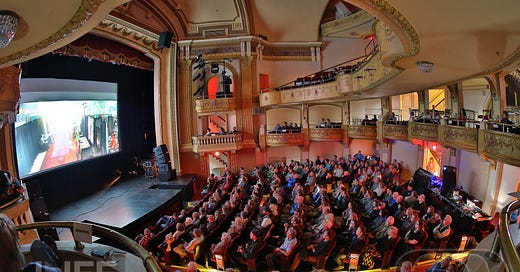Spoiled. That’s me this week. I have the luxury of participating in the Julien Dubuque International Film Festival (JDIFF) from beginning to end for the first time.
Many filmmakers from all over the country and world are premiering their work for the first time in Iowa and, for some, the first time in the United States. Award-winners from other film festivals also share the silver screens. All are looking for wider audiences and distribution deals, and most of them deserve it. The quality of the scripts and productions are high. Much of cinematography is exquisite. So are the musical scores.
If you are in the Dubuque area between now and Sunday, or want to be, you can e-mail me at openureyes@aol.com if you could use some suggestions: Films to watch or good places to eat.
This is the second year I have sponsored the “Iowa-made films” segment of JDIFF, under my pseudonym of Awestruck Nature Photos. The films include a series of six shorts ranging from 12 to 26 minutes, plus one feature. “No social change without art and music,” I always say.
The week-long JDIFF has been growing since 2012, touting itself as one of the “25 coolest film festivals in the world” and one of the “top 50 film festivals worth the submission fee” by MovieMaker Magazine. The festival is among the “Top 100 Best-Rated Festivals” on FilmFreeway.com (the leading film festival submission website), and has been recognized by Variety, AAA Living, and River Travel Magazine.
I can testify that the festival has earned its reputation as “dedicated to enriching the community and bridging cultures through the education and promotion of arts through independent film, acknowledging emerging filmmakers from around the world and supporting diverse and cause-related films.”
Needless to say, I am unable to watch all the films I want to or meet all of the talent now in Dubuque. I did sit in on a discussion about producing documentaries in so-called “Third World” countries torn by violence and war where authorities are suspicious of all outsiders. Meital Cohen Navarro hosted and talked about “why we do this.” Because: “Injustice hides in silence. Filmmakers give voice. The world needs more courageous storytellers. Be brave, but also wise, prepared and compassionate. Every risk you take must serve the story and protect the people in it.”
Meital also said some things that can easily be said about all film: “The power…is personal connection. Find the small human moments in chaos. Use visuals and sound to carry feeling, not just information. Let the audience feel what you (feel).”
Needless to say, many of the film themes and story lines are pretty heavy, so be emotionally prepared if you watch multiple films a day.
Regular readers will not be surprised to learn that my selections reflect my predilection for documentaries and dramatizations of real world scenarios, especially those with environmental themes, based on historical events, and people confronting personal and social challenges. These have included Desert Angel, Aliento (Breath), Porcelain War, Sheepdog, Singing Back the Buffalo, The Cigarette Surfboard, Seeds of Sovereignty, Mississippi Scholar, The Snare, Four Rivers/Six Ranges and Saffron Kingdom.
Plus, of course, the premiere of Dubuque native Louie Psihoyos’ latest production, Tainted Love (or Plastics Future), exploring the impact of plastics on human health, particularly fertility, and the efforts to eliminate exposure to plastics.
The first film I watched was The Invisible Doctrine: The Secret History of Neoliberalism. Anyone struggling to understand the current Trump-facilitated kleptocratic takeover of the United States might want to view this AI-visualized synthesis of economic, political, environmental, social and ideological trends across the world and the powerful interests that have fostered them since World War II.
Even if you don’t buy into the whole story The Invisible Doctrine strings together, there is plenty of conversational grist to chew on. For better or worse, I found myself thinking about and interpreting many of following films I watched through the lens and framework this film created.
At the 2024 Julien Dubuque International Film Festival with Iowa’s own Superman and Superman’s mom: Brandon and Katie Routh.
Last thoughts for today: Iowa had a scandal-plagued tax credit program for films made in Iowa until it was suspended and ultimately abolished 15 years ago. Some filmmakers took advantage of it (e.g., buying expensive vehicles as a “project expense” and shipping them home). The program administrator was over-loaded and possibly asleep at the switch.
In 2024, I worked on a bill that would have created a new rebate program for films produced in Iowa. I ultimately supported it as a pilot program because of how JDIFF could have been involved in cultivating and supporting “Iowa-grown” filmmakers and developing an Iowa-based film industry.
But the legislation had its shortcomings and didn’t pass: 1) It directly benefitted only one Iowa production company that would have had the ability to control what films got made; 2) None of the $10 million appropriation would have been earmarked for films actually made by Iowans; 3) expenses eligible included the money paid to major Hollywood stars that could have eaten up all of the rebates; and 4) no provision was included requiring an audit of the new program by the state auditor.
The proposal was revived this year by the Iowa Economic Development Authority in a complex tax policy bill that could be debated in the waning weeks of the General Assembly. But the bill has a lot of other controversial provisions.
Anyhow, hey, that’s not my gig now. My goal this weekend is to figure out how to start my own movie career after being inspired by all of the energetic and altruistic image-makers descending on Dubuque.








